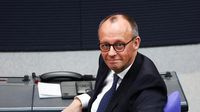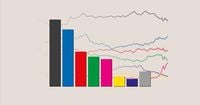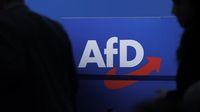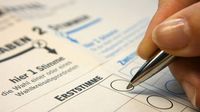In a striking shift in the political landscape of Germany, the Alternative for Germany (AfD) party has surged in recent opinion polls, closing the gap on the traditional ruling party, the Union (CDU/CSU). According to a recent Insa survey conducted on behalf of Bild, the AfD has reached 23.5 percent support, narrowing the distance to the CDU/CSU, which now stands at 27 percent, to just 3.5 percentage points. This marks the highest level of support for the AfD recorded in the Insa polling trend, as noted by Hermann Binkert, the head of the polling institute.
The CDU/CSU has suffered a two-percentage-point decline since the previous week, a significant drop that reflects ongoing strategic missteps and internal conflicts within the party. Since the federal elections in February 2025, where the AfD trailed the Union by eight percentage points, the party has been steadily gaining ground. The latest figures indicate that the CDU/CSU is now at its lowest approval level since October 2023.
In the context of coalition negotiations, the AfD is seen to benefit from the dissatisfaction among voters regarding the Union's handling of issues, particularly following the controversial debt package that failed to meet pre-election promises. Binkert elaborated, "The AfD profits from the outcome of the exploratory talks and coalition negotiations between the Union and the SPD. Ultimately, the Union has not delivered on its promises, leading disappointed voters to turn to the AfD." This sentiment is echoed by many political analysts who observe that the AfD’s rise is closely linked to the perceived failures of the Union.
Meanwhile, the SPD has also seen a decline, dropping to 14.5 percent, while the Greens have gained slightly, now at 12 percent. The Free Democrats (FDP) have increased by 0.5 points to 3.5 percent, while the Left remains stable at 10.5 percent. The newly formed party led by Sahra Wagenknecht, known as BSW, is struggling, currently polling at 4.5 percent, just under the five-percent threshold required for parliamentary representation.
Interestingly, if the CDU and CSU were considered separately, the AfD could potentially outpace the CDU, which has fallen to 21 percent. Binkert pointed out that approximately six percentage points of the 27 percent for CDU/CSU can be attributed to the CSU, suggesting a significant vulnerability for the CDU as it navigates the current political climate.
In a parallel development, the AfD has nominated Gerold Otten, a former Luftwaffe officer, for the position of Bundestagsvizepräsident. This nomination comes despite the reluctance of other parties to support candidates from the AfD, highlighting the increasing polarization within German politics. Political scientist Werner Patzelt has expressed concerns that such situations could lead to "Streit und Polarisierung und einen weiteren Aufstieg der AfD," meaning conflict and polarization could further bolster the AfD's support.
Shifting focus to the state of Hesse, a recent INSA survey conducted on March 25, 2025, indicates that the CDU is currently leading in the state elections with 31 percent support, 12 percentage points ahead of the AfD, which is polling at 19 percent. The SPD is in third place at 14 percent, followed closely by the Greens at 12 percent. The Left is projected to secure 9 percent of the votes, while the BSW is estimated to reach 5 percent, allowing it to enter the parliament.
Compared to a previous survey conducted in August 2024, the CDU has lost one percentage point, while the AfD has gained one point, reflecting a shifting voter sentiment. The SPD has improved by one point compared to the earlier poll, although it still indicates a decline from previous election results, where the CDU achieved 34.6 percent in 2023.
In terms of coalition possibilities, the current Schwarz-Grüne coalition does not have a majority, and a coalition between the SPD and CDU would only reach 45 percent, which is insufficient for a parliamentary majority. This scenario raises questions about the political future in Hesse, with potential alliances needing to be re-evaluated based on the latest polling data.
Historically, the CDU has often outperformed its polling predictions, while the Greens have tended to underperform. This inconsistency adds another layer of complexity to the current political climate, where public sentiment can shift rapidly due to various factors such as economic conditions or political scandals.
As the political landscape continues to evolve, the implications of these polling trends and coalition negotiations are profound. The AfD's rise is indicative of a broader discontent with traditional parties, prompting a re-examination of political strategies across the board. With the next federal elections on the horizon, parties will need to address the concerns of their constituents effectively to maintain their support.
In summary, the AfD's significant polling gains and the shifting dynamics within the Union and SPD underscore a pivotal moment in German politics. As coalition negotiations unfold and public sentiment continues to fluctuate, the future of these parties and their ability to respond to voters' needs will be crucial in shaping the political landscape moving forward.





